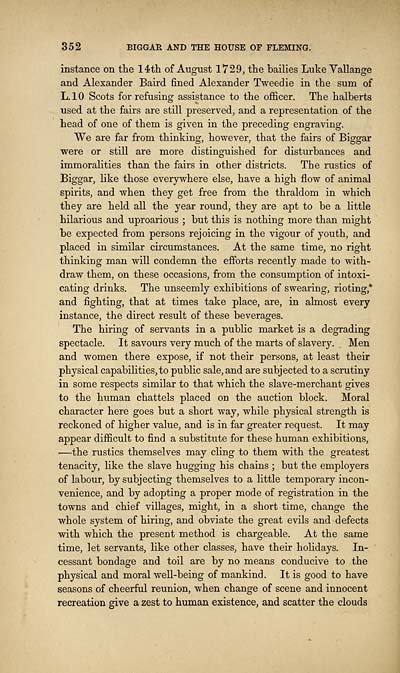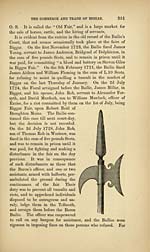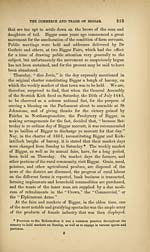Biggar and the House of Fleming
(382) Page 364
Download files
Complete book:
Individual page:
Thumbnail gallery: Grid view | List view

352 BIGGAR AND THE HOUSE OF FLEMING.
instance on the 14th of August 1729, the bailies Luke Vallange
and Alexander Baird fined Alexander Tweedie in the sum of
L.10 Scots for refusing assistance to the officer. The halberts
used at the fairs are still preserved, and a representation of the
head of one of them is given in the preceding engraving.
We are far from thinking, however, that the fairs of Biggar
were or still are more distinguished for disturbances and
immoralities than the fairs in other districts. The rustics of
Biggar, like those everywhere else, have a high flow of animal
spirits, and when they get free from the thraldom in which
they are held all the year round, they are apt to be a little
hilarious and uproarious ; but this is nothing more than might
be expected from persons rejoicing in the vigour of youth, and
placed in similar circumstances. At the same time, no right
thinking man will condemn the efforts recently made to with-
draw them, on these occasions, from the consumption of intoxi-
cating drinks. The unseemly exhibitions of swearing, rioting,*
and fighting, that at times take place, are, in almost every
instance, the direct result of these beverages.
The hiring of servants in a public market is a degrading
spectacle. It savours very much of the marts of slavery. Men
and women there expose, if not their persons, at least their
physical capabilities, to public sale, and are subjected to a scrutiny
in some respects similar to that which the slave-merchant gives
to the human chattels placed on the auction block. Moral
character here goes but a short way, while physical strength is
reckoned of higher value, and is in far greater request. It may
appear difficult to find a substitute for these human exhibitions,
— the rustics themselves may cling to them with the greatest
tenacity, like the slave hugging his chains ; but the employers
of labour, by subjecting themselves to a little temporary incon-
venience, and by adopting a proper mode of registration in the
towns and chief villages, might, in a short time, change the
whole system of hiring, and obviate the great evils and defects
with which the present method is chargeable. At the same
time, let servants, like other classes, have their holidays. In-
cessant bondage and toil are by no means conducive to the
physical and moral well-being of mankind. It is good to have
seasons of cheerful reunion, when change of scene and iunocent
recreation give a zest to human existence, and scatter the clouds
instance on the 14th of August 1729, the bailies Luke Vallange
and Alexander Baird fined Alexander Tweedie in the sum of
L.10 Scots for refusing assistance to the officer. The halberts
used at the fairs are still preserved, and a representation of the
head of one of them is given in the preceding engraving.
We are far from thinking, however, that the fairs of Biggar
were or still are more distinguished for disturbances and
immoralities than the fairs in other districts. The rustics of
Biggar, like those everywhere else, have a high flow of animal
spirits, and when they get free from the thraldom in which
they are held all the year round, they are apt to be a little
hilarious and uproarious ; but this is nothing more than might
be expected from persons rejoicing in the vigour of youth, and
placed in similar circumstances. At the same time, no right
thinking man will condemn the efforts recently made to with-
draw them, on these occasions, from the consumption of intoxi-
cating drinks. The unseemly exhibitions of swearing, rioting,*
and fighting, that at times take place, are, in almost every
instance, the direct result of these beverages.
The hiring of servants in a public market is a degrading
spectacle. It savours very much of the marts of slavery. Men
and women there expose, if not their persons, at least their
physical capabilities, to public sale, and are subjected to a scrutiny
in some respects similar to that which the slave-merchant gives
to the human chattels placed on the auction block. Moral
character here goes but a short way, while physical strength is
reckoned of higher value, and is in far greater request. It may
appear difficult to find a substitute for these human exhibitions,
— the rustics themselves may cling to them with the greatest
tenacity, like the slave hugging his chains ; but the employers
of labour, by subjecting themselves to a little temporary incon-
venience, and by adopting a proper mode of registration in the
towns and chief villages, might, in a short time, change the
whole system of hiring, and obviate the great evils and defects
with which the present method is chargeable. At the same
time, let servants, like other classes, have their holidays. In-
cessant bondage and toil are by no means conducive to the
physical and moral well-being of mankind. It is good to have
seasons of cheerful reunion, when change of scene and iunocent
recreation give a zest to human existence, and scatter the clouds
Set display mode to:
![]() Universal Viewer |
Universal Viewer | ![]() Mirador |
Large image | Transcription
Mirador |
Large image | Transcription
Images and transcriptions on this page, including medium image downloads, may be used under the Creative Commons Attribution 4.0 International Licence unless otherwise stated. ![]()
| Histories of Scottish families > Biggar and the House of Fleming > (382) Page 364 |
|---|
| Permanent URL | https://digital.nls.uk/94843866 |
|---|
| Description | A selection of almost 400 printed items relating to the history of Scottish families, mostly dating from the 19th and early 20th centuries. Includes memoirs, genealogies and clan histories, with a few produced by emigrant families. The earliest family history goes back to AD 916. |
|---|

